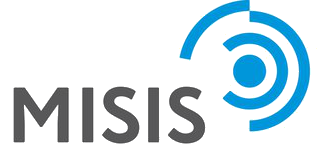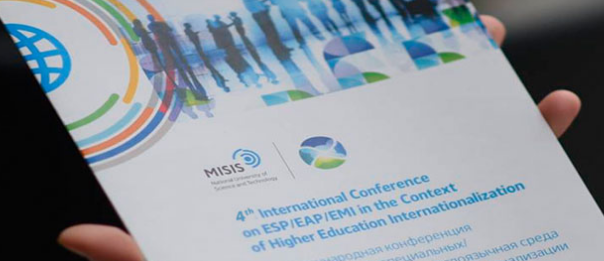November 23-25, 2017
We welcome you to join us for two days of intensive professional discussions with colleagues actively engaged in or interested in learning more about ESP, EAP and EMI. Our program features international speakers, panel discussions, master-classes, workshops and poster sessions.
Pre-Conference Events
Pre-conference events will be held on the 23rd of November 2017 and will have a distinctive education angle in informal environment. Those who are teaching in the morning on that day join us for an afternoon of workshops, informal pre-conference talks by conference guests and keynote speakers ahead of the conference kick-off.
To participate, sign up for a workshop and follow the updates on the conference site or subscribe to the conference newsletter.
In collaboration with ITEFL Pronunciation SIG


GOING GLOBAL: SPEAKING, FLUENCY, PRESENTATION SKILLS AND PRONUNCIATION
Effective speaking revolves around developing overall oral fluency. In this section, learner goals for speaking, listening and pronunciation will be examined with the aim of raising learner and teacher awareness of the requirements in these areas for effective communication in an internationalized educational setting. The section is viewed as a platform for discussing and sharing hands-on experience and best methods and practices.
In your abstract, please make it clear how the audience can apply what you say to their own context. This is especially important if you are planning to describe a course or a project, and if your presentation relies heavily on a description of a local situation.
Teaching speaking in public
- Connecting listening and speaking
- Accent and Intelligibility
- NES and NNES teachers – advantages and disadvantages in developing oral fluency
- Assessment of oral fluency
- Techniques and materials for teaching pronunciation and public speaking skills.
-
Keynote Speakers
Ken Hyland
 Ken Hyland is Professor of Applied Linguistics in education at the University of East Anglia, UK, where he has recently moved following 9 years as a professor at Hong Kong university. He has published over 220 articles and 27 books on language education and academic writing and collected nearly 32,000 citations on Google scholar. A collected volume of his work, the Essential Hyland, has recently been published by Bloomsbury. He is an honorary professor at the university of Warwick and founding member of the Hong Kong academy of the Humanities. He was founding co-editor of the Journal of English for Academic Purposes and was co-editor of Applied Linguistics.
Ken Hyland is Professor of Applied Linguistics in education at the University of East Anglia, UK, where he has recently moved following 9 years as a professor at Hong Kong university. He has published over 220 articles and 27 books on language education and academic writing and collected nearly 32,000 citations on Google scholar. A collected volume of his work, the Essential Hyland, has recently been published by Bloomsbury. He is an honorary professor at the university of Warwick and founding member of the Hong Kong academy of the Humanities. He was founding co-editor of the Journal of English for Academic Purposes and was co-editor of Applied Linguistics.Craig Thaine
 Craig Thaine has been involved in ELT for 35 years. He is Cambridge DTEFLA qualified and also has an MA (Hons.) in Applied Linguistics. He has worked as a teacher and teacher trainer in many different countries including Canada, England, Italy, Egypt, Sweden and his native New Zealand. During that time, he has taught general and academic English to all levels and been involved in pre-service and in-service teacher education and professional development to both native speaker and non-native speaker teachers. He is currently Director of Teacher Training at Languages International, Auckland. He is a Cambridge English Teaching Awards assessor for both the CELTA and Delta schemes as well as being a CELTA Joint Chief Assessor.
Craig Thaine has been involved in ELT for 35 years. He is Cambridge DTEFLA qualified and also has an MA (Hons.) in Applied Linguistics. He has worked as a teacher and teacher trainer in many different countries including Canada, England, Italy, Egypt, Sweden and his native New Zealand. During that time, he has taught general and academic English to all levels and been involved in pre-service and in-service teacher education and professional development to both native speaker and non-native speaker teachers. He is currently Director of Teacher Training at Languages International, Auckland. He is a Cambridge English Teaching Awards assessor for both the CELTA and Delta schemes as well as being a CELTA Joint Chief Assessor.Craig has published articles for The Teacher Trainer, English Language Teaching Journal and most recently Modern English Teacher. He is author and co-author of the following Cambridge University Press publications: Real Listening and Speaking Level 2 (2008), Teacher Training Essentials (2010), Cambridge Academic English Intermediate and Advanced (2012) and Cambridge English Empower Beginner to Advanced (2015).
Invited Speakers
Jon Hird
 Jon Hird is a teacher, trainer and author based in Oxford, UK, where he divides his time between teaching English at the University of Oxford and writing ELT materials. He also gives teacher-training talks and workshops both in the UK and overseas. Jon has a range of experience and interests, but with a particular interest in Grammar, English for Academic Purposes and in dyslexia and learning English. In his free time, he plays the drums. For more information see jonhird.com.
Jon Hird is a teacher, trainer and author based in Oxford, UK, where he divides his time between teaching English at the University of Oxford and writing ELT materials. He also gives teacher-training talks and workshops both in the UK and overseas. Jon has a range of experience and interests, but with a particular interest in Grammar, English for Academic Purposes and in dyslexia and learning English. In his free time, he plays the drums. For more information see jonhird.com.Bronagh Rolph
 Bronagh Rolph is Assessment Group Manager for Cambridge English. For 10 years she has been working in Assessment. Her previous 20 year experience was ELT teaching, training (CELTA & DELTA trainer and assessor) and ELT management experience for private and public education.
Bronagh Rolph is Assessment Group Manager for Cambridge English. For 10 years she has been working in Assessment. Her previous 20 year experience was ELT teaching, training (CELTA & DELTA trainer and assessor) and ELT management experience for private and public education.Heather Hansen
 Heather Hansen works globally as a pronunciation and presentation skills trainer for some of the world’s largest multinational companies. She is founder of the corporate training firm Global Speech Academy, creator of the online Pronunciation Mastery Program and author/co-author of 4 books. www.globalspeechacademy.com
Heather Hansen works globally as a pronunciation and presentation skills trainer for some of the world’s largest multinational companies. She is founder of the corporate training firm Global Speech Academy, creator of the online Pronunciation Mastery Program and author/co-author of 4 books. www.globalspeechacademy.com
Mark Hancock Mark Hancock started teaching English in 1984. He’s worked in Spain, Turkey, Brazil and the UK. He has published many pronunciation books, including Pronunciation Games (CUP 1995), English Pronunciation in Use Intermediate (CUP 2012) and PronPack 1-4 (Hancock McDonald ELT 2017). He is owner of the website pronpack.com.
Mark Hancock started teaching English in 1984. He’s worked in Spain, Turkey, Brazil and the UK. He has published many pronunciation books, including Pronunciation Games (CUP 1995), English Pronunciation in Use Intermediate (CUP 2012) and PronPack 1-4 (Hancock McDonald ELT 2017). He is owner of the website pronpack.com.Robin Walker
 Robin Walker has worked in English Language Teaching since 1981. For over 20 years he taught at the Escuela Universitaria de Turismo de Asturias before leaving to found EnglishGlobalCommunication. He now works as a freelance teacher educator, ELT author, and ELT consultant, and regularly collaborates with teacher’s centres around Spain, Trinity College London, Oxford University Press, and MacMillan Education. His main interests are pronunciation, English as a Lingua Franca (ELF), and teacher education. He is the author of numerous articles on teaching English, and of the OUP teacher’s handbook Teaching the Pronunciation of English as a Lingua Franca (2010).
Robin Walker has worked in English Language Teaching since 1981. For over 20 years he taught at the Escuela Universitaria de Turismo de Asturias before leaving to found EnglishGlobalCommunication. He now works as a freelance teacher educator, ELT author, and ELT consultant, and regularly collaborates with teacher’s centres around Spain, Trinity College London, Oxford University Press, and MacMillan Education. His main interests are pronunciation, English as a Lingua Franca (ELF), and teacher education. He is the author of numerous articles on teaching English, and of the OUP teacher’s handbook Teaching the Pronunciation of English as a Lingua Franca (2010). Magnus Gustafsson has worked in the field of communication for specific or academic purposes at Chalmers University of Technology since 1997. He directs the Division for Language and Communication and focuses his work on ‘Integrating Content and Language in Higher Education’ (ICLHE) to promote learning, language for specific purposes, and technical communication. His work in facilitating writing is process and genre oriented and focuses largely on discipline-specific communication both in terms of learning-to-write but also, and equally importantly, in terms of writing-to-learn.
Magnus Gustafsson has worked in the field of communication for specific or academic purposes at Chalmers University of Technology since 1997. He directs the Division for Language and Communication and focuses his work on ‘Integrating Content and Language in Higher Education’ (ICLHE) to promote learning, language for specific purposes, and technical communication. His work in facilitating writing is process and genre oriented and focuses largely on discipline-specific communication both in terms of learning-to-write but also, and equally importantly, in terms of writing-to-learn.The division runs multiple writing and communications programs across the university for the undergraduate level and provides electives for the MSc and PhD levels. A recurring challenge for the division is, therefore, to make sure that the communication related interventions the division designs help enhance students’ content learning while also promoting good communication practices. Important resources for the division in this work is the team-teaching with faculty from the various engineering programmes and faculty development courses since these provide the division crucial for discussing communication issues with course managers and supervisors.
Gustafsson is also a longstanding member of the European Association for the Teaching of Academic Writing (EATAW) and the outgoing chair of the association. With EATAW, he has tried to contribute to the development of writing in higher education by working for the association’s journal as a guest editor for three special issues in connection with the association’s conferences or related projects.
Important Dates
Date Deadline/Activity 25 July, 2017 Registration opens 17 October, 2017 Abstract submission deadline 23 October, 2017 Notification of abstract acceptance 23 October, 2017 Notification of presentation/workshop schedule 10 November, 2017 Complete programme available 18 November, 2017 Registration for conference and pre-conference events closes 20 November, 2017 Pre-load day for all the presentations to be tested 23 November, 2017 Pre-Conference Events 24-25 November, 2017 Conference Our Partners



